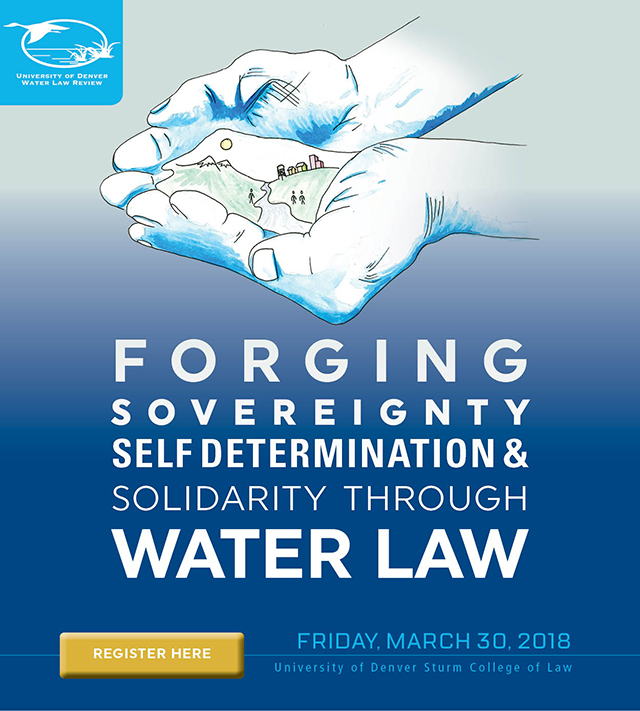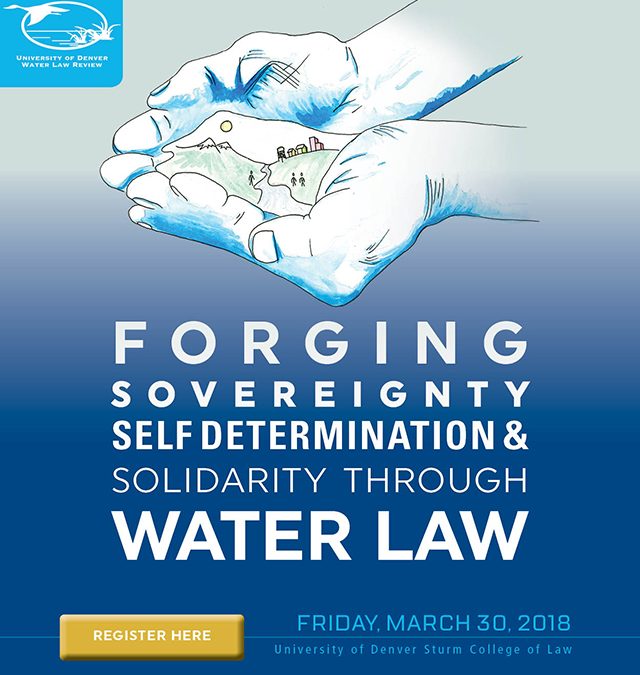 The University of Denver Sturm College of Law Water Law Review will present its eleventh symposium, “Forging Sovereignty, Self Determination, and Solidarity through Water Law,” on Friday, March 30. From the symposium’s website:
The University of Denver Sturm College of Law Water Law Review will present its eleventh symposium, “Forging Sovereignty, Self Determination, and Solidarity through Water Law,” on Friday, March 30. From the symposium’s website:
Water has long served as a source of both great conflict and critical collaboration in the history of the United States. Especially for historically marginalized communities of American Indians, Chican@s and Blacks, ownership, control, access and distribution of water rights has often been fleeting and limited in both scope and duration. Though these same communities have contested their marginalization in the realm of water law and policy sometimes through courts and other times through political and social mobilization, they have encountered apathy, resistance, and sometimes hostility to their claims.
This year’s symposium aims to bring those issues together. “The current political climate and conversations around race and inequity are pressing,” says Lindsey Ratcliff, this year’s symposium editor for the Denver Water Law Review. “It is important to listen to these conversations, understand their intersectional nature, and question how they relate to allocation of our most precious resource—water. The symposium seeks to identify how and in what ways water lawyers, policymakers, and DU Law can work for and in collaboration with underserved communities on issues of water rights and water justice now and into the future.”
During this year’s symposium, each panel will host a variety of speakers from different aspects of water law. Where possible, the symposium invited speakers who represent impacted communities, Ratcliff says, such as Ernest House Jr. From the Ute Mountain Ute Tribe who will speak on the tribal sovereignty panel, moderated by Justice Greg Hobbs, a University of Denver Distinguished Jurist in Residence, and WEco board member.
“Water justice includes turning senior reserved tribal water rights to use,” Justice Hobbs says. “The protracted effort to implement the Ute Water Rights Settlement is a cautionary tale full of promise.”
Other talks will look at preserving and protecting the Chican@’s water heritage, building municipal water self-determination in diverse metropolitan communities, calling water and civil rights leaders to action, and navigating unbundled and unrepresented water litigants.
“It is not unusual to have pro se or limited scope representation litigants in water court cases, particularly in rural sections of Colorado,” says Zach Smith, staff attorney with the Colorado Water Trust will be serving on the panel unbundled and unrepresented water litigants panel. “Our ethics panel will help lawyers identify and manage ethical issues that can arise in those circumstances.”
Other speakers scheduled to appear include counsel for the Ute Mountain Ute Tribe and the Southern Ute Tribe, the heads of the Colorado People’s Alliance and the Colorado Commission of Indian Affairs, attorneys from Denver Water, the National Association for the Advancement of Colored People, the Colorado Water Trust, the New Mexico Legal Aid, and private practices, as well as representatives of acequias in Southern Colorado.
“Understanding how our current water law regimes promote and prevent certain communities from equitable allocation of water resources is essential to ensuring human dignity for all today and into the future,” Ratcliff says. “The difficulties communities of color and indigenous populations face when it comes to securing safe and accessible water resources has never been discussed before at the Water Law Review Symposium, and it seemed like a perfect topic to explore this year.”
Learn more about the symposium and register to attend here.


 Print
Print
Reblogged this on Coyote Gulch.